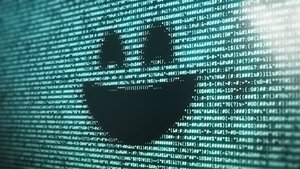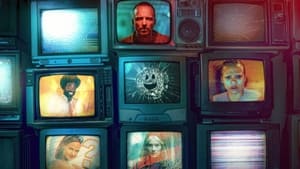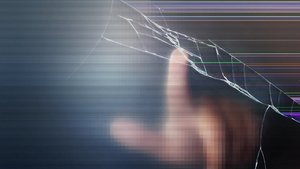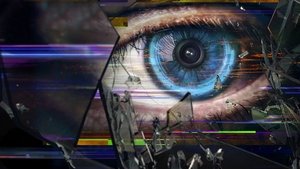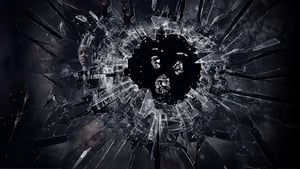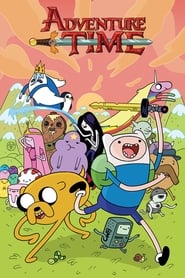
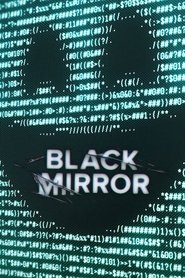
Watch the Latest Black Mirror Hollywood Shows
Video trailer
Synopsis
Synopsis
Black Mirror is an British anthology TV series developed by Charlie Brooker, first debuting in December of 2011. Each episode is a stand-alone tale (with fresh characters, locations and, often, the tone) which explores the dark aspects of technology and media in near-future or alternate reality.

The title is a metaphor for the reflective, black screen (like televisions, smartphones and computer monitors) that function as mirrors of the present, reflecting the dependence of technology. (Reddit) By constructing speculative stories, Black Mirror examines the ways in which human social and natural systems as well as power, identity and ethics are interwoven with rapid technological advances.
Through its existence the show has received praise for its original concepts and suspenseful storytelling, however, it has not been without controversy. The series currently spans seven seasons (plus the animated movie called Bandersnatch) with various episodes and lengths.
Quick TV Info
| Attribute | Detail |
|---|---|
| Title | Black Mirror |
| Creator | Charlie Brooker |
| Country of Origin | United Kingdom |
| Language | English |
| The number of seasons / series | 7 |
| The number of episodes | 33 (not counting Bandersnatch) |
| Episode Length | The typical time is between 40 and an hour |
| Network Platform | The channel was originally Channel 4 in the UK later bought through Netflix |
| Genre | Sci-fi, Drama, Thriller, Anthology |
| Reception / Rating | The general consensus is generally favorable, e.g. 83 percent for Rotten Tomatoes for the series overall |
| Notable Awards | Numerous Emmy Awards (notably for San Junipero, USS Callister, Bandersnatch) |
This short article gives an overview of the details Black Mirror is in terms of production, format and reception.
Summary of Plot
Since Black Mirror is an anthology that means there isn’t a single common plot that runs through every episode. Each episode has its own story, which is often dissident or speculative, and usually in the near future or alternative present. But, some themes recur: technology as a dual-edged force and the loss of privacy, the identity crisis memory manipulation, social surveillance virtual reality, as well as ethical questions.
To provide a few examples: examples:
- In the first Episode, “The National Anthem”, a member of the British royal family is abducted and is demanded by the kidnapper that the Prime Minister do an act of shocking public humiliation. This incident instantly sets a mood of spectacle in the media and moral pressure. It also demonstrates the way that public opinions and broadcast media cross.
- In other episodes the technology plays a larger role in other episodes: characters upload their consciousness, implant recording chips inside their brains, participate in virtual worlds, or use devices that assess the social status of a person (as the case in The Nosedive).
- Within Bandersnatch in the interactivity film in which the main character creates a video game that has multiple narratives that branch out and the structure allows for choice in the narrative.
- A few later episodes focus on supernatural or horror aspects like Mazey Day, that introduces metaphorical werewolf themes that blend media scrutiny and transformation.
- The seventh season of the show’s an episode Plaything revisits elements from Bandersnatch Connecting universes and exploring the implications for our lives on artificial intelligence, memory and.
In these stories, there’s typically a reversal or twist at the conclusion, however some stories avoid the twist for a quieter psychological effects.
In the end, Black Mirror is more about a narrative that is continuous but more focused on thematic resonance. It explores the ways that emerging (or speculation-based) technologies could magnify human flaws, introduce threats to our security, or challenge expectations about what is human.
Themes and Analyses
Black Mirror is full of thematic layers. Here are a few of the most well-known as well as some analysis and examples.
Technology as an amplifier, not the Root Cause
The most frequent theme is that technology isn’t inherently bad but it does amplify human fears, desires, and weaknesses. Black Mirror often states that the issues arise in the way humans utilize or misuse technology’s potential. (CBR) For instance surveillance, control social pressure, and a desire for approval are human urges Technology increases their impact and affects.
Identity Mind, Memory, and Identity
Many shows explore the nature of identity and consciousness in the context of memory that is recorded, erased or transferred. What do I really mean when my memories are able to be altered? What is the effect of the digital versions (“cookies”) from individuals exist? San Junipero, USS Callister, and Be Right Back explore these boundaries of self-identity.
Surveillance, Privacy and Social Control
The tension between exposure to the public and the private self is a frequent theme. Episodes such as the Nosedive as well as Thirteen Million Merits explore rating systems, social credits and continuous performance. The series is a reflection of fears regarding how digital surveillance (from corporate or government agencies) affects behaviour and agency.
Isolation, Alienation and Disconnection
Despite the ubiquitous connections, Black Mirror frequently depicts characters who feel isolated, isolated and emotionally disengaged from their peers. The more we depend on technology to connect and connectivity, the more fragile our human connection becomes in this view. (CBR) The illusions created by technology of intimacy often conceal more void.
Moral Ambiguity and Consequences
In lieu of clearly defined characters or villains, a lot of shows place characters in moral gray zones. There are trade-offs to be made and consequences are uncertain. The series eschews easy judgments and frequently leaves questions unanswered and prompts to think.
The posthumanist and the existential risk
As technology expands its reach into the human body and mind, Black Mirror asks the question whether humans can transcend bodies? Can AI or virtual reality replace “real reality”? Certain episodes are pointing towards the future of dystopian technology that could threaten human autonomy or dignity.
Media, Spectacle and Voyeurism
The series is often aware of the media’s role in creating the public’s perception of spectacle and performances. The National Anthem is one of the most popular episodes. the episode The National Anthem, the kidnapping turns into a live-telecast incident. Other episodes see characters see their lives being broadcast or altered to appeal to viewers. The show focuses on the ways in which voyeurism and media consumption change the way we view values.
Through the weaving of these themes Black Mirror weaves an eerie mirror that is held to the present and asks: What if we took certain technological trends to the extreme?
Controversy and Criticism
Although widely lauded, Black Mirror hasn’t been without criticism. The most significant controversies and criticisms include:
Technological Determinism, Pessimism, and Negative Thinking
The most common complaint has been it is that Black Mirror often depicts a grim, dystopian approach to technology, stressing the dangers of technology more than its potential advantages. Some believe that this is due to technological determinism – the notion that technology always causes harm. The series, according to critics, sometimes does not have the nuance or the balance when thinking of technology as pure evil.
Declining Quality/Formal Structure
Many critics and fans believe that the later seasons (especially seasons 5, 6 and 7) exhibit signs of diminishing the originality. Certain episodes are thought of as being based on cameos from celebrities and predictable plot twists or reusing ideas. There are those who argue that earlier seasons were more focused on speculative technology and greater morality, while the later seasons shift to broader and more general narratives.
Dependence on Twist Endings
A few viewers think that the show is too reliant on twist endings or shocking revelations, often at the cost of character development or emotional grounding. When a twist is broadcast in a way, it can feel like gimmicky. (Reddit)
Ethical Impacts, Realism and Implications
Certain episodes are deemed to be unrealistic or show technological advancements that viewers may find absurd. Some critics question whether the technological leaps (e.g. memory uploading and the perfect simulation) are rooted in real philosophy or science. The balance between speculative fictions and grounded realism is unbalanced.
Emotional Relativity or Coldness
Because a large portion of the episodes are based on concepts and twists certain critics have said that the emotional arcs seem weak or that the characters are serving the idea more than vice versa. The show has been accused of putting intellectual stimulation rather than emotional depth.
Reception for specific episodes
Some shows have drawn particularly sharp criticism. For example, Mazey Day (Season 6) was accused of exaggerating the logic of the show by mixing horror from the supernatural with pop culture. Critics criticized the show for calling its concept weak. Additionally, Black Museum (Season 4) was met with mixed reactions although it was conceptually exciting however, critics felt it was too crowded and its twist was is polarizing.
In spite of these critiques, the show has a loyal fan base and many are impressed by its ideas, ambitions and the ability to challenge thought rather than the comfort of.
Cinematography and Style
The one of Black Mirror‘s strengths is the way it combines visual style and conceptual ambition. Although each episode is different in terms of tone and set it has a few consistent stylistic elements and decisions that give it its distinctive style and identity.
Eye Cleanliness, Cold Beauty and Visual Aesthetics
The majority of shows feature stark minimalist, clinical, or sterile settings, such as white walls, sparkling surfaces, smart-device interfaces sleek tech designs. This “cool” style often contrasts with the dark and emotional tone of the story, causing an aesthetic dissonance that increases the sense of dread.
Futuristic Yet Familiar Design
The production design is often grounded in technology to come in the future. mixing the common (smartphones tablets screens) with new speculative innovations. This allows for the continued sanity of the present, making the speculative elements seem like future possibilities instead of a distant dream.
Close-ups and intimate framing
Close-ups of characters and tight framing, a small depths of field and the occasional silence are all common. These types of shots emphasize inner emotional states, the weight of emotions, and the fear of being watched or trapped.
Utilization of Reflections, Screens and Mirrors
Given the show’s meta motif, screens, reflections, and mirrors frequently appear in compositions–characters seen through monitors, reflections in glass, or faces obscured by dark screens. These visual elements emphasize the concept of technology as mirrors to the human condition.
Tonal Variatility
Since the episodes are varied cinematography may shift in some episodes feeling expansive and cinematic, whereas others feel more gritty or hand-held. The style of the show is adapted to the emotional mood. For instance, episodes about surveillance could be more documentary or voyeuristic when episodes on virtual reality might use more stylized or surreal visuals.
Use of sound, editing and Editing and
The editing is often rapid and languid, which can cause confusion or to lull viewers until they are captivated by a sudden twist. The sound design is subtle yet precise. Ambient hums, silences, mechanical echoes or glitches highlight the technology theme. When the moment is crucial silence or abrupt cuts increase the tension.
All in all, Black Mirror‘s aesthetic and stylistic choices are in line with its philosophical aims Technology is never an afterthought, but is a part of how the show appears, feels and communicates.
Cultural Impact
Black Mirror has made a profound impression on the world of television, culture and the public’s understanding of the effects of technology. The impact of the show is evident in several aspects:
The Anthology Format is Getting a Refresh
In a time when serialized storytelling is the norm, Black Mirror was able to bring back a high-concept, anthology format for adult sci-fi and drama viewers. Alongside shows such as American Horror Story or Inside No. 9, it demonstrated that storytelling in anthologies could be economically viable and an extremely rich thematically.
“Black Mirror Moment” as a Cultural Shorthand
The phrase “a Black Mirror moment” has become a popular term, it refers to real-world events which evoke uneasy analogies to episodes e.g. the controversy surrounding surveillance or social media’s excessive reach, deepfake scandals, research into AI or public shaming that is fueled by media that is viral. Many journalists and commentators cite it when talking about technological ethical issues.
Influence on other Works
The show influenced the narratives of creators and writers across media, including films, shows and books that explore near-future technology fears are increasingly taking on Black Mirror‘s speculative moral frame. Certain works are emblazoned with their source material on sleeves in a way that echoes its themes or structure.
Public Conversations and Tech Ethics
Black Mirror has been a catalyst for public debate regarding privacy as well as data, AI social media and the human agent. It combines entertainment and philosophies and has made people think about the everyday technology How much surveillance should I allow? What are my values shaped by the platforms I use? It promotes technology literacy by playing up ethically ambiguous questions.
Academic and Critical Engagement
Researchers are increasingly studying Black Mirror within the fields of media studies, philosophy ethics, as well as critique of culture. It’s lens for exploring posthumanism, surveillance society biopolitics, digital identity and the speculative future.
Global Reach via Streaming
After moving from the BBC to Netflix, Black Mirror was able to reach a wider audience, which contributed to its global fame and its cultural resonance across all countries and not just the UK.
Sequel Episodes and evolving format
“” In season 7 (2025) The show breaks with tradition by introducing an episode that is a sequel USS Callister, thus blurring the strict standalone nature of the episodes. This indicates that the show is in the process of evolving, and experimenting with new possibilities for narrative.
In the end, Black Mirror has become a key cultural reference point in how we envision and think about the future of technology.
Where to watch?
In the moment, Black Mirror is available exclusively through Netflix which has rights to stream the entire season globally. In many countries, this is the only legal option for viewing all seasons and the entire series, Bandersnatch. (The original UK broadcaster, Channel 4, Channel 4, aired the beginning seasons before being acquired by Netflix purchase.)
Based on the your country regional streaming services or broadcasters could have licenses for Black Mirror episodes. Make sure you use legal and licensed services that respect the rights of creators.
Frequently Asked Questions
Q: Are the characters of Black Mirror connected across episodes or in a shared universe?
Generally, no. Most episodes are stand-alone featuring distinct characters as well as locations. However, there are some Easter eggs or references in between episodes (e.g. branding, companies, tech names). The Bandersnatch film directs interaction with the core universe and, during Season 7 the plaything connects back with Bandersnatch. The scheduled USS Callister sequel is also one of the first narrative continuations that are direct.
Q: Are all episodes positive or happy conclusion?
No. Most episodes end unclearly or in a dark way. Some offer glimpses of hope or redemption (e.g. San Junipero). The tone of the show is uncertain and cautious, as the majority of stories end in either tragedy, reversal or even lingering confusion.
Q: Which are the best to begin with?
Some of the most acclaimed shows are “San Junipero”, “White Christmas”, “USS Callister”, “The All-You-Knowledge of You”, “Nosedive”, and “Black Museum”. They showcase the show’s variety of emotional, speculative and imaginative storytelling.
Q: Does Bandersnatch important to be watched?
Bandersnatch is an interactive film in the Black Mirror world. It’s not required however it provides the viewer a unique experience of choice and consequences as well as references in subsequent episodes (e.g. Plaything).
Q: Does Black Mirror always rely on a twist conclusion?
While a lot of episodes employ an unexpected surprise or twist, but they are not all. Recent seasons have seen the creators have often emphasized emotional or psychological arcs instead of shock.
Conclusion
Black Mirror stands as a benchmark in contemporary television. It’s a provocative and often disturbing investigation of how technology interacts with the human condition, ethics, and the broader society. The anthology’s freedom of choice allows it to play with themes and tone, while each episode is an ominous fable for our technologically-driven age.
While the series has drawn valid criticism for pessimism, formulaic twists, and occasional weakness in character or logic, it remains compelling because it refuses to offer easy solutions. Instead, it challenges viewers to ask unsettling questions: When we develop tools, do the tools create us? Who is in charge of technology and who is influenced by it? What is the price consumers pay to enjoy convenience, connection, and advancement?
We are at a technological crossroads, with AI and augmented reality, surveillance infrastructure, deepfakes, and consciousness modeling. Black Mirror continues to seem eerie. Beyond 2025, it will be more than just a movie but a speculative mirror of the decisions we are making now.
Original title Black Mirror
TMDb Rating 8.3 5,674 votes
First air date Dec. 04, 2011
Last air date Apr. 10, 2025
Seasons 7
Episodes 32


